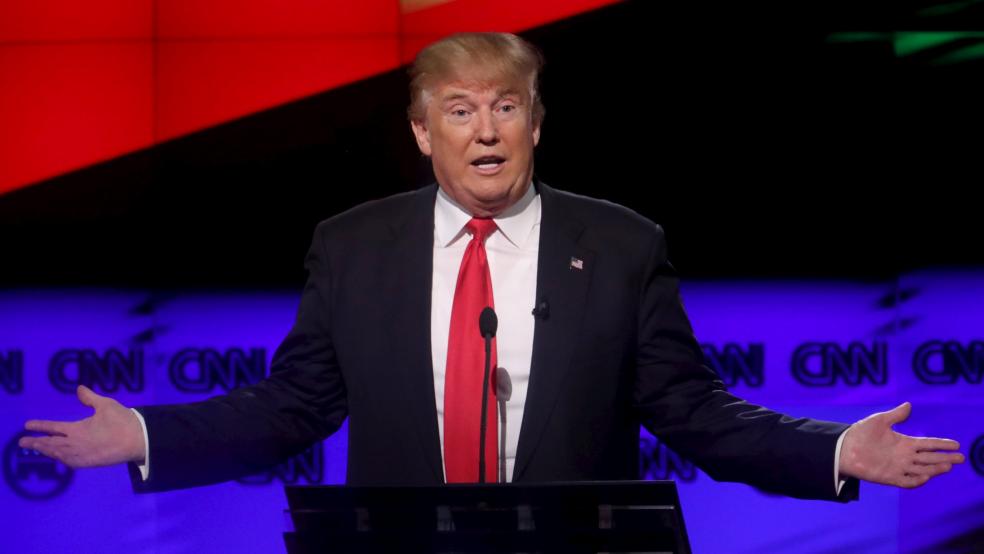Donald Trump is never short of controversial remarks and highly unlikely policy positions, but his recent ventures into foreign affairs have prompted unusually sharp reactions even by Trump’s standards.
First came a scathing open letter from 120-odd Republican national security experts published a few weeks ago. Then, lengthy interviews just published in The New York Times and The Washington Post.
The new consensus is that Trump is wildly irresponsible on matters of foreign policy—a dangerous threat to global stability and U.S. national interests. Many of his policy proposals are indeed wild on many counts: irresponsible, impractical, unworkable, and illegal--the shortest route to calamity.
Related: 10 Foreign Policy Experts Who Think Trump Could Destroy America
We’re going to do what to the families of known terrorists? We’re going to stop buying oil from the Saudis, just like that, if they don’t commit troops to the fight against the ISIS? This isn’t a serious conversation, many people say—and rightly.
So let’s make it one. This column is no endorsement of Trump, but name-calling never counts as a counter-argument. What’s at issue here? Why is the foreign policy establishment the latest constituency to declare Donald Trump a public enemy?
Of the many issues on which Trump has opined, two stand out as the most important--NATO and our trans-Pacific alliances. Together they represent the twin pillars of the U.S.-led postwar order.
Related: Ex-Trump Insider: Donald Doesn’t Want to Be President
Trump disputes the role of NATO in the post-Cold War context, calling it “obsolete” as currently constituted and in need of a “reconfiguring.” In an interview with David Sanger and Maggie Haberman at The Times’ last week, he said:
“When NATO was formed many decades ago we were a different country. There was a different threat. The Soviet Union was … was much bigger than Russia…. So NATO is something that at the time was excellent. Today, it has to be changed. It has to be changed to include terror. It has to be changed from the standpoint of cost because the United States bears far too much of the cost of NATO.”
Trump’s questions about America’s trans-Pacific allies are in the same line. He thinks we should renegotiate the U.S.-Japan Security Treaty: “I mean, that’s not a fair deal,” he says. Trump would also pull troops back from Japan and South Korea if they don’t foot more of the bill, and he’d consider letting both nations develop nuclear weapons:
“There is going to be a point at which we just can’t do this security umbrella” [in the western Pacific]. “It’s a position that at some point is something that we have to talk about, and if the United States keeps on its current path of weakness they’re going to want to have [their own nuclear deterrent] anyway with or without me discussing it…. With our Japanese relationship, if we are attacked they don’t have to do anything. If they’re attacked, we have to go out with full force. That’s a pretty one-sided agreement right there.”
Related: Trump Unplugged: Now He Predicts a Massive Recession and Much More
Trump has flip-flopped on some of his wildest statements. We do not want a nuclear Japan or a nuclear South Korea, for instance, although India was confirmed as a nuclear power in 1998 with no great consequence. (In that case, the U.S. imposed sanctions that were more or less pro forma; the George W. Bush administration lifted them in 2001.)
Mistakes aside, there are truths in Trump’s views on these questions that deserve consideration. NATO and Washington’s Asian alliances are essential to U.S. primacy in world affairs, but both are indeed in need of a reconsideration. No one has to vote for the messenger, but shooting him is not a substitute for a necessary debate.
It has been clear since the Cold War’s end Asians have to find their own equilibrium with their newly powerful next-door neighbor, China—and this means as Asians, not as American allies.
This doesn’t mean the sun is setting on Washington’s Pacific alliances: Not even the Chinese are suggesting that. But it does mean the U.S. must come to terms with a changing political, diplomatic, and security landscape in the Pacific. True stability requires flexibility; if it’s the consistency of concrete, it will eventually crack.
Related: North Korea Lashes Out at China, Threatens a ‘Nuclear Storm’
As to NATO, Trump joins George Kennan, Henry Kissinger and many others in questioning the treaty organization’s post-Cold War mission. It’s no secret that its eastward thrust over the past two decades has been problematic—if not a mistake altogether.
Why, then, is it suddenly a perilous breach to suggest that we reconsider NATO’s role? The thought’s not the problem, apparently, so much as the man who’s advancing the thought.
The volleys between Trump and his legions of adversaries in the foreign policy debate are worrisome for one simple but significant reason above all. The world order is changing, and America’s place in it is in a transition so complex no one can quite define it yet.
No one ever thought these realities would be delivered by Donald Trump, but he has thrown down the gauntlet. Odd as it seems and as much as he probably didn’t even mean to, Trump raises important questions.
That’s not to say he has to be in on the answers. But our brightest minds on the foreign policy side have to be able to accept the inevitability of change and navigate it to America’s advantage and everyone’s benefit. Their responses to Trump suggest they aren’t there yet.






